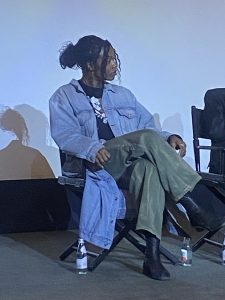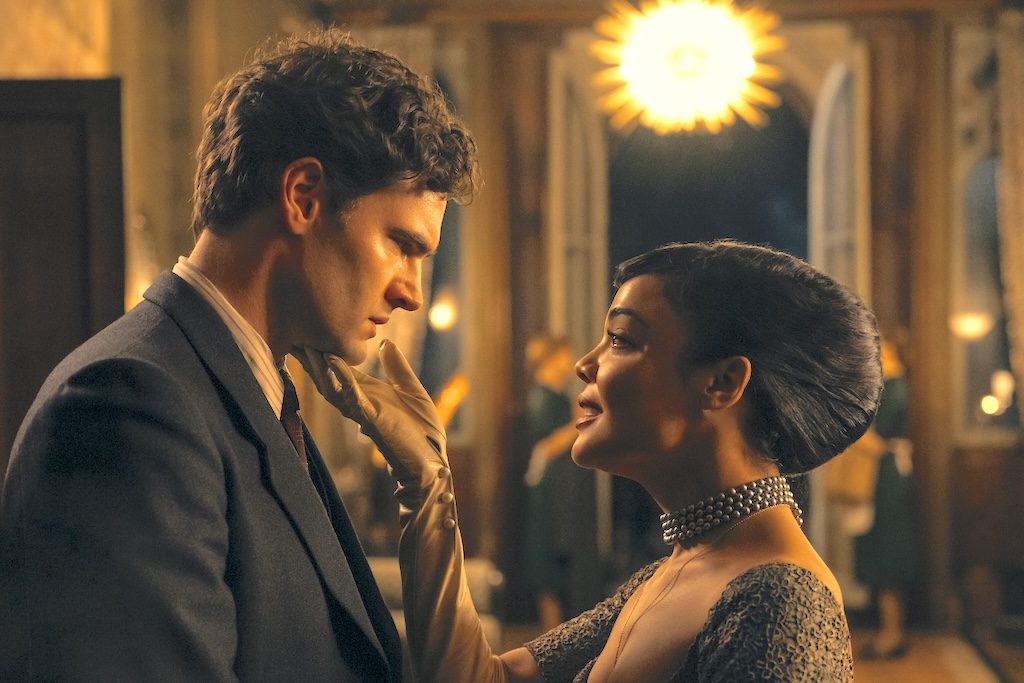Reinventing Hedda: Nia DaCosta, Tessa Thompson, and Nina Hoss Redefine the Ibsen Classic for a New Era

What does it take to breathe new life into a theatrical masterpiece? For writer/ director/ producer Nia DaCosta, actor/producer of Hedda, Tessa Thompson (who plays Hedda Gabler), and actor Nina Hoss (who portrays Eileen Lovborg), the answer is radical empathy, audacious reinvention, and a willingness to excavate the thematic essence of Henrik Ibsen’s 1891 play Hedda Gabler.
Their adaptation Hedda, is more than an update — it’s a transformation. In this in-depth conversation, the creative team reveals how their Hedda became a platform for modern social struggles, and a showcase for women’s agency and queerness.
Nia DaCosta on Reimagining Hedda
Nia DaCosta’s vision for Hedda is both personal and bold.
“My first time reading Henrik Ibsen’s Hedda was a revelation. Dark, funny, tragic, insightful, gonzo, sexy and honest. It was a look into the gnarled, needy heart of a mad and bad woman. And I loved her. I thought the things she did were horrific, but in watching her strive, for purpose and purchase in a life she hated, I saw a cracked mirror reflecting a struggle that many of us have — to be seen and understood even as we struggle to understand ourselves,” the filmmaker expresses.

Nia DaCosta
Soon after reading the play and watching various productions, DaCosta realized that the things she loved about the original didn’t translate in modern iterations of Hedda. “Missing was the humor, the intentionality, and the fun I read between the lines of Ibsen’s writing,” she says. Her initial thoughts were to stage a lavish theatrical production, but eventually, she settled on a film version.
Like many classic plays that had been re-envisioned for modern audiences, like turning Pride and Prejudice into Bridget Jones’ Diary, Emma into Clueless, or The Taming of the Shrew into Ten Things I Hate About You, DaCosta knew Hedda was ripe for a characterful adaptation.
“For a hundred years, Hedda has been the most unknowable and complex woman in theater, so I choose a prism of this multifaceted person and shined a light through it. The first item on my agenda was to dig deeper into the themes of a woman finding agency, finding access to whatever they think freedom is, in a world that tells them they are not entitled to self-possession or power,” she muses.
Full Circle Beginnings: A Project Meant to Be
For DaCosta, Hedda was a project that arrived at precisely the right moment. “Sometimes things come along and come around when they’re supposed to,” she says, describing how she integrated song lyrics written years earlier into the film’s DNA.
Tessa Thompson was initially surprised to be invited to collaborate: “Nia called me and she told me that she was thinking about an adaptation of Hedda Gabler, but I didn’t think that she meant for me… When I understood that she meant we could make it together, I was so struck. I didn’t understand why.” Thompson, who first encountered Ibsen as a teenager, admits that Hedda “was not the Ibsen lady of my dreams. But obviously, it’s one of the dreamiest ladies you can play in theater.”
It wasn’t until reading DaCosta’s first draft that Thompson saw the vision: “She wanted to take it apart and put it back together in her image and in our image… to mine out the things that are on the page in Ibsen’s work, but not always on the stage.”
Revisiting Hedda: Nina Hoss and the Power of Reinvention
For Nina Hoss, few characters are as familiar as Hedda Gabler — she played the role for six years on the Berlin stage. Yet DaCosta’s approach made it feel entirely new. “When do you ever have the chance to revisit something? I thought, I’m never going to get back to Hedda… And it just opened my mind completely. It was like a new material, new play. And it changed everything,” she says.
A significant departure from the original was transforming Ejlert Lovborg into Eileen, recasting the character’s gender and relationships. Hoss reflects: “Hedda didn’t quite take him seriously, or he could ever be that kind of partner that Eileen could be for Hedda. That I found so amazingly interesting… How do we play that these two really know each other, but they just can’t be with each other? And I never saw that in the original play,” Hoss explains.
Tearing Down and Rebuilding: The Art of Adaptation
DaCosta approached adaptation as both demolition and homage. “One of my most instructive and inspiring films that made me want to be a director was Apocalypse Now… Some of my favorite films — like ‘Clueless,’ ‘10 Things I Hate About You’ — all reinvent classics. Classical works stand the test of time because we also keep reinventing them in our image and our time… The original exists and adaptations that are true to the original will always happen.”
Her first major creative leap — making Ejelert a woman — reshaped the story’s emotional nucleus. “If Ejelert were a woman… then I have this other woman who’s trying to figure out how to be a person when society’s telling her that she’s not allowed to have agency, personhood or power… Another woman who you give the same struggles as Ejelert — ‘I’m brilliant, no one’s listening to me.’ That’s so relatable,” the filmmaker continues.
This decision turned Hedda, Eileen, and Thea (Imogen Poots) into the story’s thematic heart: “You have these three women at the center of the piece who are showing us these different paths to personhood.”
The Chemistry of Reinvention: Building a Modern Hedda
Reinventing Ibsen’s venerable text demanded both courage and collaboration. “We had so many conversations about that together and we’d pick it apart,” Thompson recalls. “There was a period where I really missed the aunt in the beginning of the play, and [Nia] was like, ‘Let her go. She’s not coming back.’”
Ultimately, the freedom was liberating. “Eventually it became the biggest kind of anchoring thing in our conversations that we were making something new… a Hedda that was her own animal,” Thompson adds.
Hoss was fascinated by Thompson’s performance: “She played a Hedda that knows how to use her femininity, how to play men and women… never really showing what she is really thinking and what she’s up to. And I think what makes her dangerous in that way is that she doesn’t know it herself.”

George Tessman (Tom Bateman) and Hedda Gabler (Tessa Thompson) Photo courtesy of Amazon Studios
Eileen’s Journey: Power, Freedom, and Truth
For Hoss, Eileen’s journey is about both triumph and pain. “To me, the starting point was what she tells George Tessman (Tom Bateman) when she’s already quite drunk… I had the feeling this probably initiated something in Eileen, and she fell in love. And she knew, this is me. I can’t help it. So, I developed her from that moment on, and then figuring out that you’re a writer, that you can think, that you’re more brilliant than others in the room.”
The adaptation’s treatment of queerness and womanhood is both provocative and nuanced for the era. “What that meant — living an openly queer life at the time, not shying away from it. It’s Hedda, just a woman who tries to figure things out, how to find what freedom is.”
DaCosta highlights a pivotal scene in the film: “I just knew it was important for Hedda. She doesn’t know at the end of the night that Eileen’s gonna shoot herself… letting Eileen walk out with herself exposed was a reaction to, ‘I don’t love you anymore.’ But for Hedda, that’s just the beginning.”
For DaCosta, the struggle for power is ultimately a struggle for freedom: “For all the women in the film, they’re struggling for freedom, but instead they go for power, and power does not equate to freedom. It was really important for me to show that through Eileen’s journey.”
A New Ending: The Power of Ambiguity
DaCosta’s Hedda does not meet the same fate as in Ibsen’s play. Thompson reflects: “I really like this idea that even in the murkiness and the muck, and the things that she does that are really unsavory, that she’s valid. And I think that grace is not something that’s always afforded, particularly in challenging female characters.”
A particular stage direction stuck with Thompson: “‘Hedda, caught between dark finality and dark possibility, can do nothing but break into a wild, wicked, and wanting smile.’ I just thought it was such a beautiful piece of text… that kind of ambiguity, that kind of thing that I think is very true, which is things are at once — at once there is possibility, and at once, we’re doomed.”
The ambiguity is intentional. “We’ve had a lot of conversations around: is Hedda a victim or is she a villain? And I think that also really depends on you and how you see it. I love that in a piece of work,” declares Thompson.
Join the Discussion!
Related Articles
Browse our Videos for Sale
[woocommerce_products_carousel_all_in_one template="compact.css" all_items="88" show_only="id" products="" ordering="random" categories="115" tags="" show_title="false" show_description="false" allow_shortcodes="false" show_price="false" show_category="false" show_tags="false" show_add_to_cart_button="false" show_more_button="false" show_more_items_button="false" show_featured_image="true" image_source="thumbnail" image_height="100" image_width="100" items_to_show_mobiles="3" items_to_show_tablets="6" items_to_show="6" slide_by="1" margin="0" loop="true" stop_on_hover="true" auto_play="true" auto_play_timeout="1200" auto_play_speed="1600" nav="false" nav_speed="800" dots="false" dots_speed="800" lazy_load="false" mouse_drag="true" mouse_wheel="true" touch_drag="true" easing="linear" auto_height="true"]










You must be logged in to post a comment Login